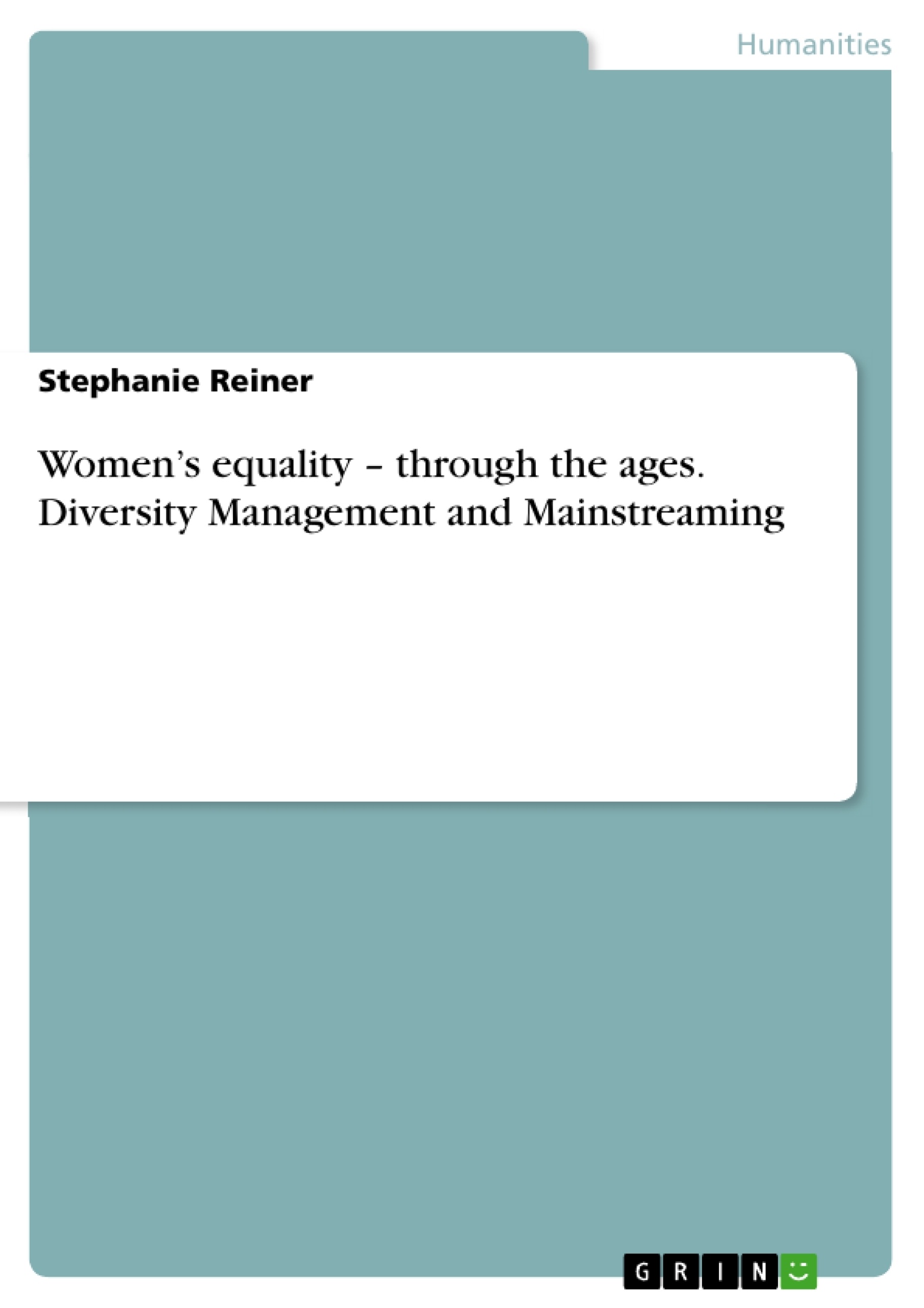“Men and women are equal” (article 3 Basic Law), in spite of this article women have a disadvantage in Germany in many matters – especially in their professional life. But the last century had a lot of changes.
For the 19th century it was believed that boys and men are “more valuable”. (Pawlak) This has been seen in their rights, because only men were allowed to go to election. (Spiegel) Women had no right to vote and could not study therefore not being able to graduate or get a degree from school. The male sex was considered to be smarter in several areas than women. Women’s work was expected to be cleaning, cooking, washing and baby-sitting. Not until the 1820’s, “girl schools” were introduced, but only for the higher classes of society. However, the goal of these schools was not for general education. The goal was to prepare women for the role as mother and housewife. Therefore, these schools taught mainly household topics. (Pawlak)
Inhaltsverzeichnis (Table of Contents)
- 1. Introduction
- 2. Theory
- 3. Hypothesis
- 4. Methods
- 4.1. Historiography
- 4.2. Statistics
- 4.3. Questionnaire
- 5. Results
- 5.1. Primary research - survey of students and passersby
- 5.2. Secondary Research - Federal Office of Statistics - birthrate
- 6. Discussion
- 6.1. Discussion of the historiography
- 6.2. Discussion of the questionnaire
- 6.3. Discussion of the statistic “birthrate” from the Federal Office of Statistics
- 7. Recommendations
- 8. Lessons learned
- 9. Summary
Zielsetzung und Themenschwerpunkte (Objectives and Key Themes)
This work aims to explore the historical development of women's equality in Germany, specifically focusing on their professional lives. It examines the shifts and challenges faced by women throughout the 20th century, highlighting the societal, political, and economic factors that shaped their roles and opportunities.
- Historical evolution of women's equality in Germany
- Challenges and opportunities for women in professional life
- Impact of societal norms and policies on women's roles
- The influence of historical events and political regimes on women's equality
- The role of education, suffrage, and social movements in advancing women's rights
Zusammenfassung der Kapitel (Chapter Summaries)
- Introduction: This chapter introduces the topic of women's equality in Germany, highlighting the persistent disadvantages women face, particularly in professional life. It provides a brief overview of the historical context and the evolving perspectives on women's roles throughout the 19th and 20th centuries.
- Theory: This chapter delves into theoretical frameworks and concepts related to women's equality, exploring the underlying social and economic structures that contribute to gender inequalities. It provides a foundation for understanding the complexities of the issue.
- Hypothesis: This chapter presents the central hypothesis of the study, outlining the specific questions and predictions that will be investigated throughout the research.
- Methods: This chapter details the research methodologies employed in the study, outlining the specific approaches used to collect and analyze data. It includes information about the historiography, statistical analysis, and questionnaire design.
- Results: This chapter presents the key findings of the primary and secondary research conducted. It includes analysis of the survey results from students and passersby, as well as data from the Federal Office of Statistics on birth rates.
- Discussion: This chapter offers a critical interpretation of the research findings, discussing the significance of the results and exploring the implications for women's equality in Germany.
- Recommendations: This chapter presents recommendations based on the research findings, outlining potential solutions and strategies to address the challenges faced by women in their professional lives.
Schlüsselwörter (Keywords)
The main keywords and focus topics of this work include women's equality, gender inequality, professional life, historical development, societal norms, political influence, education, suffrage, social movements, research methodologies, and statistics. This study explores the complex interplay of these elements in shaping the progress of women's rights in Germany.
Frequently Asked Questions
What was the status of women's education in the 19th century?
In the 19th century, women had no right to study or graduate. "Girl schools" introduced in the 1820s primarily focused on household topics to prepare them for roles as mothers and housewives.
When did women gain the right to vote in Germany?
The text highlights that in the 19th century only men were allowed to vote; women's suffrage was a major milestone achieved later in the 20th century.
Does the German Basic Law guarantee gender equality?
Yes, Article 3 of the Basic Law states that "Men and women are equal," although the text notes that disadvantages in professional life persist despite this legal framework.
What were the traditional expectations of women's work?
Historically, women were expected to handle cleaning, cooking, washing, and childcare, as they were often considered less capable in intellectual areas compared to men.
What is "Diversity Management and Mainstreaming" in this context?
These are modern strategies aimed at achieving gender equality and integrating diverse perspectives into professional and societal structures to overcome historical disadvantages.
- Arbeit zitieren
- Stephanie Reiner (Autor:in), 2013, Women’s equality – through the ages. Diversity Management and Mainstreaming, München, GRIN Verlag, https://www.grin.com/document/212283



